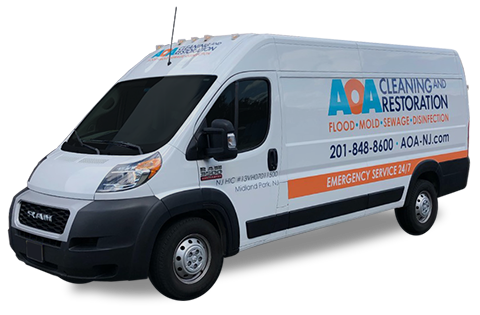Did you know fixing water damage in a home can cost about $3,814? Sometimes, it can go up to $10,000. This makes a small problem very expensive. When looking at homes in Northern New Jersey, you might wonder if buying a house with water damage is a good idea.
It’s important to know about water damage in Northern New Jersey before buying. Water damage can harm the house’s structure and the health of those living there. It can cause mold and weaken foundations. Also, insurance might not cover damage if it was there before you bought the house.
When deciding, it’s good to know about water damage. Learn what causes it, how to spot it, and the costs of fixing it. In older homes or those fixed quickly, hidden damage might be more serious than it seems.
Key Takeaways
- The average cost to repair water damage is approximately $3,814, but can exceed $10,000 in severe cases.
- Homeowners insurance companies frequently deny claims for pre-existing water damage issues.
- Signs of water damage can include mold, structural weaknesses, and even risk of wood-destroying insects like termites.
- Conducting a thorough inspection, including specific areas of known concern like crawl spaces and window seals, is critical.
- Legal and financial implications, including seller disclosure laws and possible lawsuits, should be considered.
- Negotiating for repair estimates or price reductions based on identified water damage can give you an advantage.
- Understanding the local real estate market and available options can shape your decision.
Understanding Water Damage: A Critical Consideration for Buyers
Buying a home in Northern New Jersey with water damage needs careful thought. It’s important to know the different types of water damage and why they happen. This knowledge helps buyers make smart choices, even when dealing with water damaged homes.
What is Water Damage?
Water damage happens when water gets into a building, causing problems. It can damage the structure, lead to mold, and harm building materials. Leaks, floods, overflows, or burst pipes are common causes.
Forbes Advisor says water damage causes 24% of home insurance claims. Claims can cost around $12,514. Fixing mold can cost between $4,000 and $7,000.
Common Causes of Water Damage in Northern NJ Homes
Northern New Jersey homes face many water damage risks:
- Heavy Snowfalls: Harsh winters can cause ice dams and burst pipes.
- Aging Infrastructure: Older homes often have outdated plumbing that leaks and fails.
- Severe Storms: Heavy rains and floods are common, needing separate flood insurance.
- Poor Drainage: Bad drainage systems can cause water to gather around the home, harming the foundation.
Signs of Water Damage to Look For
Spotting water damage signs during a property check is key for buyers. Look out for:
- Discolorations and Stains: Water marks on ceilings, walls, or floors mean leaks.
- Musty Odors: Damp smells often mean mold, from untreated water damage.
- Structural Deformities: Warped or sagging floors or walls suggest water damage.
- Peeling Paint or Wallpaper: Moisture can make paint or wallpaper peel off walls.
Spotting these signs helps buyers negotiate better deals and repair costs. Getting advice from experts is also very helpful. It helps buyers deal with water damage in Northern NJ homes and makes a big difference when investing in such properties.
Assessing the Cost and Financial Implications of Water Damaged Properties
Buying a property with water damage comes with a lot of costs. It’s important to understand all the financial aspects involved. This includes the different costs and possible financial risks.
Conducting a Water Damage Inspection
A detailed house inspection for water damage is the first step. It looks for any water damage, from small leaks to big structural problems. In places like New Jersey, where laws are strict, finding hidden damage is key.
It’s best to hire experts who know about water damage. They can give a clear picture of the situation.
Obtaining Repair Estimates
After the inspection, getting repair estimates is next. The cost of fixing water damage can vary a lot. For example, in New Jersey, flood damage can cost millions each year.
Getting several estimates helps buyers negotiate the price. It also helps them plan for future costs. Knowing the repair costs helps compare it to other options in the market.
Impact on Property Value and Insurance Considerations
Water damage can lower a property’s value. It can cause structural problems and mold, making the property less desirable. Homes with water damage may be harder to sell and need a lot of repairs to increase value.
Buyers should think about the long-term effects of climate-related events. Over 75% of homeowners have faced weather-related issues in the last five years. It’s also important to know how insurance covers water damage, as damage from big disasters is increasing.
In summary, understanding the costs of water-damaged properties is complex. It involves a detailed review, from inspections to repair costs. Buyers should carefully consider their decision with all the information and advice from experts.
Is it Worth Buying a House with Water Damage in Northern New Jersey?
Thinking about buying a house with water damage in Northern New Jersey? You need to consider many things. We’ll look at the good and bad sides, the financial benefits, how to negotiate, and the long-term risks.
Pros and Cons of Buying Water Damaged Properties
Buying a water-damaged home might seem like a good deal. You could get a property for less money. Sellers might be more open to negotiations because of the damage.
But, there are downsides too. You might face unexpected repair costs and ongoing problems. It’s important to know how bad the damage is and what it could mean for the future.
Financial Incentives and Negotiation Tactics
Looking at the financial side, water-damaged homes might be cheaper. Negotiating can help you get an even better deal. You could ask for clauses that cover repair costs or help with closing costs.
Getting detailed repair estimates is key. This way, you can negotiate based on all the costs involved.
Long-term Investment Considerations and Risks
Buying a water-damaged home in Northern New Jersey comes with long-term challenges. You might need to do a lot of maintenance and deal with mold. The value of the property could also go down.
It’s important to look at the past damage. For example, in New Jersey, flood damage over 15 years could cost around $25,000. Properties with water damage might sell slower and need a lot of work before they can be listed.
Under a certain climate change scenario, these costs could rise to $32,000. This could affect the property’s future value. So, getting a professional inspection and understanding local laws is vital for a smart investment.
Conclusion
Buying a home with water damage in Northern New Jersey is complex. Buyers must carefully consider the risks and benefits. It’s important to understand the costs of repairs and how water damage affects the property’s value and insurance.
Getting thorough inspections and accurate repair estimates is key. Seeking advice from professionals is also vital. This helps buyers make informed decisions.
Buyers can try to negotiate for financial benefits. But, they must be aware of the risks. Issues like mold, foundation problems, and extra insurance costs can impact the investment.
Using insights from Comparative Market Analysis (CMA) reports and professional inspections is helpful. This way, buyers can make smart choices.
Buying a water-damaged home in Northern New Jersey needs careful thought. It’s important to understand how water damage affects the property’s value and insurance. Planning for repairs is also essential.
Being well-informed about water damage is critical. It helps balance the risks and opportunities. This ensures a wise investment.
FAQ
What is water damage?
Water damage happens when water gets into places it shouldn’t. This can cause things like rust, rot, or mold. It often comes from leaks, floods, or overflows.
What are common causes of water damage in Northern NJ homes?
In Northern NJ, water damage often comes from heavy snow, old buildings, clogged gutters, and bad drainage. The area’s extreme weather also plays a role.
What signs of water damage should buyers look for during inspections?
Look for stains on walls and ceilings, a musty smell, and warped floors. Visible mold and structural problems are also signs. These can show there’s water damage.
How should buyers conduct a water damage inspection?
Buyers should get a pro to check the property for water damage. They should look at basements, attics, and bathrooms. It’s also important to check the plumbing and drainage systems.
What should be considered when obtaining repair estimates for water damage?
Get several repair quotes from trusted contractors. Make sure the quotes cover immediate fixes and long-term solutions. This includes waterproofing and improving drainage.
How does water damage affect property value and insurance considerations?
Water damage can lower a property’s value, which can be a big problem. Insurance can be tricky. Make sure the property is well-covered for water damage to avoid big costs.
What are the pros and cons of buying a water-damaged property?
Buying a damaged property can be cheaper and let you make repairs. But, there are risks like high repair costs and selling problems. Buyers need to think carefully before deciding.
What financial incentives and negotiation tactics can buyers use?
Buyers can ask for a lower price because of the damage. They might also get help from the seller, like covering repairs or giving credits at closing.
What long-term investment considerations and risks should buyers be aware of?
There are risks like ongoing maintenance, health issues from mold, and selling problems. Buyers should plan for these and think if they can handle the upkeep.
How important is professional guidance when buying a water-damaged property?
Getting help from experts is key. They can give advice, estimates, and negotiation tips. This helps buyers make smart choices.






